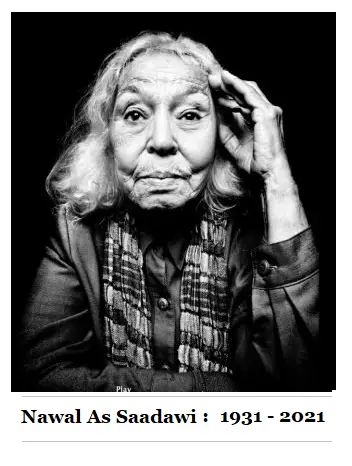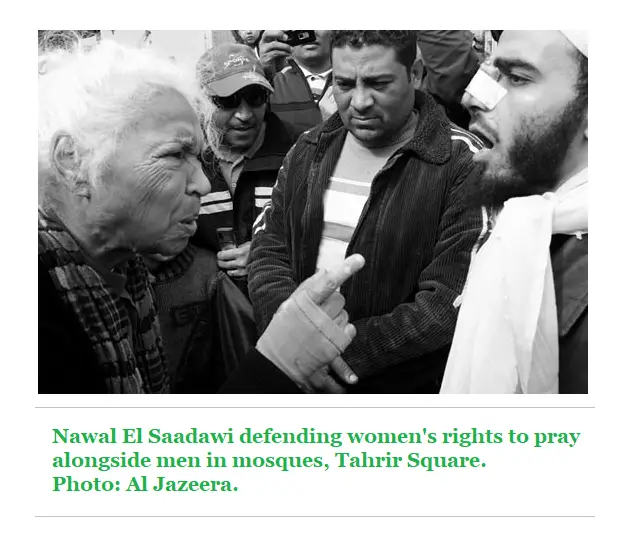Articles divers
© The scientific sentence. 2010

| |
|
Articles
Science and societies
Nawal As-Saadawi
Nawal As-Saadawi
The emancipation of women ..
 Who is she ?
Who is she ?
Nawal As Saadawi is a committed writer, psychiatrist and feminist fighter. She was born
on October 27, 1931 in Kafr Tahla, north of Cairo, and died on March 21, 2021 in Cairo,
Egypt. She is great figure in the emancipation of women in the Arab world.
She was excised at the age of 6. His family has nine children. Contrary to old habits,
they all went to school, boys and girls. Nawal As Saadawi was a brilliant student.
In 1949, she entered medical school. After graduating from Cairo University in 1955,
she went to study at Columbia University in New York, USA.
Always dynamic, once graduated, she returned to practice in her native village.
In 1966, she was appointed Director General of Public Health at the Cairo
Ministry of Health.
For having published her book "Woman and sex" in 1969, she was dismissed in 1972
from her post at the Ministry of Health. "Health" magazine, of which she was
responsible editor, is banned and her books are censored.
In 1976, she was a writer at the Higher Institute of Literature and Science. From 1978
to 1980, she was a researcher at the Faculty of Medicine of Ain Shams University in Cairo.
In Lebanon, she was an advisor for the United Nations Economic Commission for West Africa.
She divorces three men, a medical student, a wealthy traditionalist, then a doctor and novelist.
Her fights
In 1981, she opposed the one-party law enacted by President Anouar Es-Sadat.
She was then arrested and imprisoned on September 6 of this year in Qanatir prison,
among the 1536 men and women of all political tendencies, considered dangerous for
his regime. She was released on October 25, after three months of imprisonment and
the assassination of Sadat, under the regime of President Hosni Mubarak.
In 1982, she created the association AWSA, Arab Women's Solidarity Association.
After her novel "the fall of the Imam", in 1987, published in Cairo, she began
to receive threats from fundamentalist islamist groups. When her name appeared on
a fundamentalist death row, she flew with her husband to the United States, where
she taught at Duke University and Washington State University in Seattle.

In 1991 the AWSA association was banned, and Nawal, threatened with death by
religious extremists, went into exile in the United States with her husband.
She will be back in Egypt in 1996.
Accused of apostasy in 2001, her criticism of radical Islam once again earned
her the threat of death. A lawsuit for apostasy is launched against her and an
attempt is even made to force her to divorce her husband.
In January 2007, she released a play titled "God Resigns in the Summit Meeting".
Deemed blasphemous by the Islamic University of Cairo, this book was withdrawn from
sale even before the opening of the trial brought against it on the complaint of
al-Azhar University for apostasy and non-respect of religions. She goes into exile
again. A petition is launched. In 2008, she won her case and returned to Egypt,
but continued to teach in the United States.
On February 3, 2011, she supported the demonstrators in Tahrir Square in Cairo,
for the departure of Mohammed Hosni Mubarak. On March 8, 2012, she initiated, with
seven other Arab women, the Call of "Arab Women for Dignity and Equality".
Her literary works
Nawal El Saadawi is the author of around fifty books. She started writing in newspapers
and magazines. Her first novels appeared in the 1950s. Here are the best known:
• Memoirs of a Woman Doctor, 1958.
• Women and Sex, deals with sexuality, religion , trauma of excision,
and other taboo subjects, 1969.
• She Has No Place In Paradise, open criticism of the patriarchal system and taboo subjects,
such as excision, abortion, sexuality, and the different forms of oppression of women, 1972.
• Woman at Point Zero, testimony from Ain Shams University on women's mental health, 1975.
• Ferdaous, a Voice in Hell, a novel in which the author, psychiatrist reports the
words of Ferdaous, a prisoner who will be executed, published in Egypt in 1975.
• Woman and. Psychological Struggle, essay, 1976.
• The Hidden Face of Eve, 1977.
• The Veil, during a stay in Addis Ababa where she reveals
her thoughts to the reader, but not to her lover, 1978.
• The Fall of the iman, 1987.
• The discovery and publication, as it is, forty five years after having written
it, Diary of a Child Called Souad , 1990. a work of youth which already expresses its critical spirit.
• God resigns from summit meeting, 1996.
• Memoirs of the Women's Prison, recounts the episode relating to her incarceration, 2002.
• Isis, a play that is both funny and caustic, 2008.
• It's Blood, a novel published in Beirut, testifies for female emancipation,
and against pseudo-religious laws, 2014.
She has received numerous honors in the form of literary prizes.
Title
Nawal As Saadawi is an Egyptian writer, psychiatrist, and feminist.
During her three months of incarceration under President Anwar as Sadat's regime, she used her time to write her book "Memories of Women's Prison", on a roll of toilet paper, with an eyebrow pencil introduced by a prisoner . This book was published in 2002 in London.
“I will continue to write. I will write even if they bury me, I will write on the walls if they confiscate my pencils and papers; I will write on the ground, on the sun and on the moon.The impossible is not part of my life”, she says in her book “Memoirs of the prison of women”, 1983
Thanks to her fights, the excision of young girls becomes a punishable crime and single mothers obtain the right to transmit their surname to their children.
On the occasion of his birthday, I pay tribute to her ..
-- Abdurrazzak Ajaja
October 2022
Pendant ses trois mois d'incarcération sous le régime d'Anwar As Sadate,
elle a utilisé son temps pour écrire son livre "Mémoires de la prison
des femmes", sur un rouleau de papier toilette, avec un crayon à
sourcils introduit par une prisonnière. Ce livre est publié en 2002
à Londres.
|
|